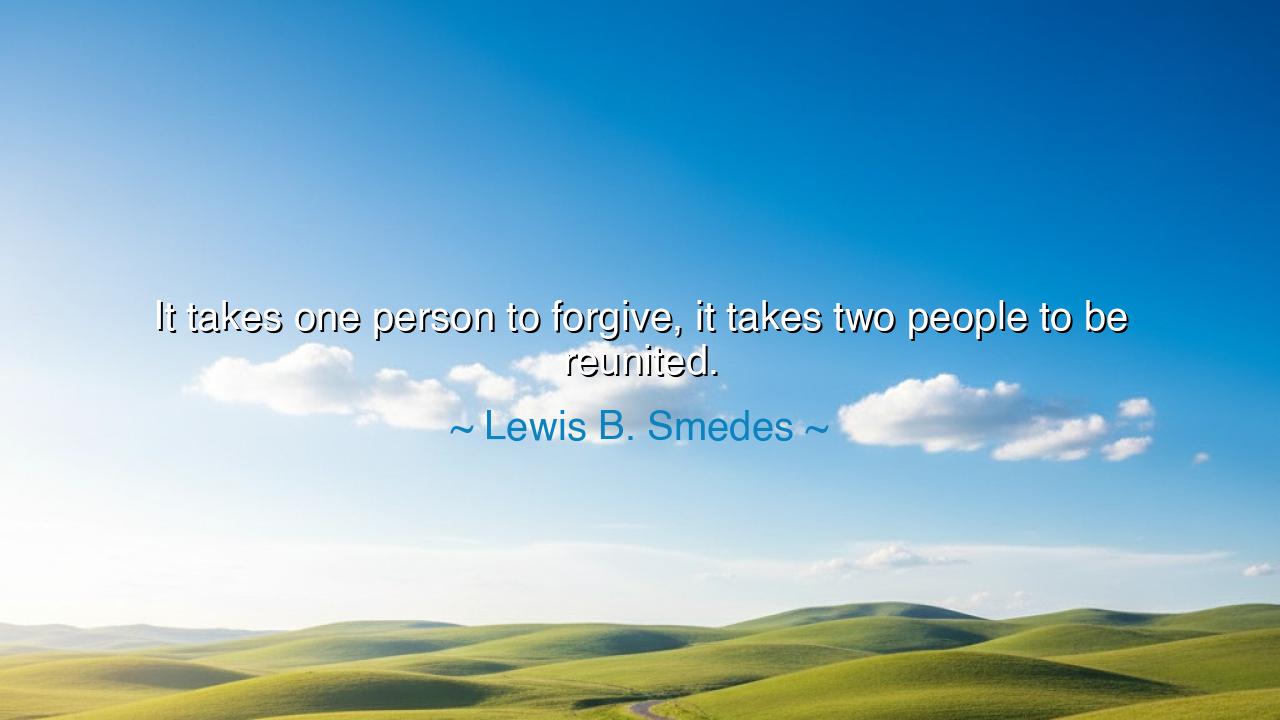
It takes one person to forgive, it takes two people to be






Hearken, O seekers of the heart and the wisdom of reconciliation, to the words of Lewis B. Smedes, the sage of grace and human bonds: "It takes one person to forgive, it takes two people to be reunited." In this utterance lies the ancient truth that forgiveness is a sacred act of the soul, yet reunion—true restoration of relationship—demands the willing participation of both hearts. One may release bitterness, yet unity is born only when both souls embrace healing.
In the theater of human connection, many bear wounds of anger, betrayal, or disappointment, yet few understand that forgiveness is the first step toward freedom. Smedes illuminates that the act of forgiving is a solitary power, an inward liberation that unshackles the spirit from resentment. To forgive is to reclaim the self, to cleanse the heart of the corrosive weight of grievance, even if the other remains distant.
The ancients, who chronicled the ways of love, friendship, and kinship, understood that reunion is a sacred dance requiring mutual grace. One may extend the hand of reconciliation, yet without the response of the other, the circle remains incomplete. True reunion is a covenant of two willing hearts, joined in recognition, humility, and shared intention, restoring harmony that alone could not be achieved.
Yet this teaching carries subtle depth: forgiveness and reunion are distinct yet intertwined. Smedes’ insight urges the seeker to act with courage in granting forgiveness, understanding that the path to restoration begins within, but reaches its fulfillment only through the conscious return of the other. To forgive is noble; to reconcile is divine, a shared alchemy of spirit.
Therefore, O children of mercy and wisdom, let this teaching lodge in your hearts: one heart alone can release resentment through forgiveness, but the beauty of reunion demands the embrace of two. In granting mercy and seeking reconciliation, one honors both the self and the sacred bond of connection, walking the timeless path of healing and the eternal wisdom of the ancients.






NGNe Gau
This quote touches on the complexity of human relationships. It says forgiveness is a solo act, but the reunion requires two people. I wonder if there are cases where one person’s forgiveness is enough to bring both people back together. Does reconciliation always require both parties to participate fully, or can one person’s willingness to forgive sometimes create the space for the other person to also reconcile?
DDduy duy
It’s clear that forgiveness is crucial for healing, but this quote suggests that forgiveness alone doesn’t guarantee that a relationship can be mended. What do you think happens when only one person is ready to forgive? Does it create an imbalance in the relationship, or does it offer an opportunity for the other person to eventually come around and also seek reconciliation?
DQDiem Quynh
Forgiveness is an act of grace, but reconciliation is an ongoing process that involves both parties. How do you balance the need to forgive with the reality that reconciliation might not always happen? In your opinion, is it possible to forgive someone, but decide that a reunion just isn’t healthy or possible anymore?
LDLuong Dong
It’s interesting that the quote mentions it takes one person to forgive, but two people to reunite. It makes me think about how powerful forgiveness can be, but also how it can fall short without the willingness of both people to rebuild trust. Have you ever experienced a situation where one person was ready to forgive, but the other person wasn’t ready to come back into the relationship?
PNPham Ngan
This quote makes me wonder if forgiveness is always necessary for a relationship to heal. Is it possible to move forward without full reconciliation? Maybe one person can forgive, but if the other party doesn't acknowledge their wrongdoing, does true healing still occur? Can you forgive without expecting a reunion, or is the reunion a necessary part of the process?